Herod Antipas
Lesson 3.10
Jesus before Herod exposed a hedonist king living for his pleasures. Christ gave this man no respect and no responses. Hedonism receives little mercy from God, but there is always hope for a living soul.
Please read Luke 23:6-12 before starting GraspingGod.com's free Bible study lessons, #3.10.
Previous lesson: Jesus Before Pilate #3.09.
Preliminary Bible Study Questions:
1) Who was Herod the Great?
2) Who was King Herod?
3) Who killed John the Baptist?
Hey, welcome back. We're following Jesus Christ through the Passion Week and today's lesson finds Jesus standing trial before King Herod. Let's study the encounter and see what we can learn about Jesus and our own lives and culture. There is a LOT of hope for serious sinners found in this lesson.
Let's begin with a little background work on King Herod by looking at this predecessor, King Herod the Great.
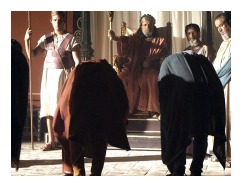
King Herod the Great
Herod's father, Herod the Great, was the governor of Galilee from 37-4 B.C. He became the official king of Judea during his leadership.
His overall reign of 33 years was marked by a drastic rise and equally drastic fall. He proved capable of ruling the large region of Palestine, known for his fighting abilities, negotiation skills and diplomacy. He built many great buildings, including the Temple complex in Jerusalem (John 2:20).
Herod had a wicked side, as well. He had all the Jewish male babies killed who posed a threat to rule the region (Matthew 2:13-16).
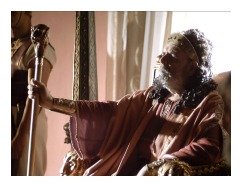
He also killed his wife, Mariamne, but it haunted him.
Later, he killed their two sons, Alexander and Aristobulus, after they became aware of his guilt in their mother's death.
The Jews had a saying about Herod, "It is better to be Herod's pig (Gr = hys) than to be his son (Gr = huios)."
Herod
experienced ten marriages with a total of fifteen children. His
personal life cost him his political life as it took a tremendous toll
on him and his office. Discovery! (click) King Herod the Great's Tomb.
Four of his sons began reigns over smaller portions of his kingdom after Herod the Great died.
Herod Antipas
Herod Antipas inherited the reign over Galilee and Perea and was referred to as their tetrarch. He reigned from 4 B.C. to A.D. 39, thereby making him ruler during most of Jesus' life.
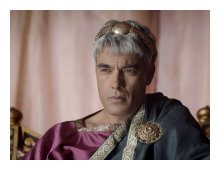
Like his father before him, Herod Antipas allowed his immorality to bring down his reign. Unfortunately for him, he didn't possess his father's leadership abilities.
Herod Antipas was married to the daughter of Aretas, the Nabatean king.
While still married, he became infatuated with his half-brother's wife, Herodias. Herodias left her husband, Herod Philip I, for Antipas. Antipas left his wife, eloping with Herodias, creating a huge scandal in the kingdom.
This immoral fiasco partly brought down Herod Antipas years later, because he suffered huge losses of troops after Aretas attacked him for the shame inflicted upon his daughter (i.e. Herod's spurned wife). The Roman emperor finally banished Antipas to a remote region of France, never to be heard from again.
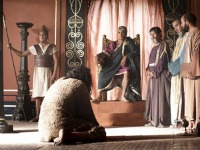
John the Baptist
John the Baptist publicly renounced Herod Antipas during the tetrarch's affair and illegal marriage to Herodias (Mark 6:17-18).
Herod personally heard John the Baptist preach a number of times, greatly enjoying his preaching.
The truth John the Baptist preached interested Herod, actually perplexing him. However, when John the Baptist continued his harsh rebukes against Herod Antipas for his incest and immorality, he ended up in prison.
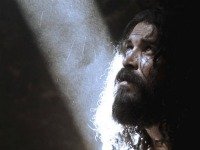
Herod Antipas respected John the Baptist, admiring him and his delivery style. Personally, I sense that Herod Antipas appreciated the entertainment value that John the Baptist brought to him - not saying that John the Baptist attempted anything of the sort.
Herod Antipas was known for his perversion and extravagance, which leads me to believe this theory. His conscience must have been seared by sin at this point in time. Sexual sin, especially something so degrading as incest, normally blinds a person to truth (1 Timothy 4:2).
I can't imagine Herod contemplating a new life in God, although, stranger things have happened!
At his birthday party, Herod and his friends were reveling in his step-daughter's dancing.
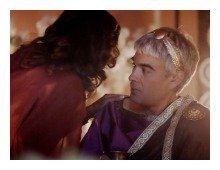
Herod Antipas was so pleased that he told his step-daughter that she could have anything she wanted (Mark 6:21-22).
After asking her mother, Herodias, what she should ask from him, she requested "I want you to give me at once the head of John the Baptist on a platter!" (Mark 6:25).
Herod Antipas wasn't happy about this request, but to save face in front of a crowd, he had to follow through with her request. Sadly, another prophet of God was martyred for the sake of righteousness.
Jesus Christ and Herod Antipas
Herod heard many stories about Jesus, who presence and ministry puzzled him (Luke 9:7-9). He possibly heard details from his business manager, Chuza, whose wife was a female disciple of Jesus (Luke 8:3). Herod attempted many times to watch Jesus and catch some of his miracles and hear some of his teaching. It didn't happen.

Jesus Christ was preaching in the region of Perea when a couple Pharisees warned him about Herod desiring to kill him. The Pharisees told him because, either 1) they actually were enjoying Jesus' preaching, wanting to protect him; or, 2) they wanted Jesus out of the region because of his confounding preaching.
Regardless of the reasons, Jesus told them, "Go tell that fox that I will keep on casting out demons and healing people today and tomorrow; and the third day I will accomplish my purpose. Yes, today, tomorrow, and the next day I must proceed on my way. For it wouldn’t do for a prophet of God to be killed except in Jerusalem!" (Luke 13:31-35).
Jesus called him a fox and according to rabbinical writings, the term "fox" was used for crafty, useless people.
Jesus was on a mission and no earthly king could derail the mission.
He used the terminology "today, tomorrow, and the third day" because he was on the sovereign timetable of his Father and no immoral, degenerate ruler was going to thwart the mission.
Jesus had no interest in, or any use for this despicable man, who earlier killed the one who prepared his way, John the Baptist (Matthew 14:13).
Sometimes, after prolonged grievous sin, God leaves sinners to their own devices (Romans 1:24).
The Trials Of Jesus
Pontius Pilate had a brilliant idea at one point during Jesus' trial (Luke 23:6-7). He sent Jesus to Herod Antipas because Herod ruled over Galilee, Jesus' hometown region.
Pilate was hoping to disengage from the trial and the intense pressure exerted by the Jewish leaders. Had Pilate been reported to Caesar one more time, it could have been his last day as governor. Pilate wanted to avoid threats to his office at all costs.
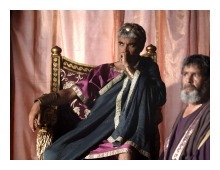
Jesus finally stood before King Herod, who was happy to see Jesus. He had heard much about Jesus (Mark 3:6), even believing he may have been a reincarnated John the Baptist (Mark 6:16). The king also wanted to see Jesus Christ perform miracles.
Herod Antipas was hoping for some entertainment, something to make him marvel. He wanted magic. Jesus paid no attention or respect to this murdering hedonist.
Roman royalty was noted for their extravagant lifestyles. They possessed overindulgent appetites and enjoyed drunken revelry. Sexual perversion had no boundaries. They also had an insatiable hunger for entertainment.
Herod Antipas was one of the worst on record. The more beautiful the building - the better; the larger the banquet - the better; the more costly the wine - the better; the more immoral the woman - the better; and the bloodier the entertainment - the better.
The motto of hedonism is "Eat, drink and be merry, for tomorrow we die." Herod Antipas reveled in the worldly philosophy condemned in Romans 1:18-32.
If a person doesn't fill the sensual, sinful desires of a hedonist, then that person is considered expendable to the hedonist. How much greater the risk if someone doesn't please a hedonist king?!
Jesus didn't meet expectations for Herod Antipas, and thereby was considered expendable. Herod became incensed at Jesus for not answering his questions or performing miracles.
He and his guards began mocking the Christ. They placed a royal robe around him, mocking his claimed kingship over the Jews.
Jesus had to endure the non-stop accusations by the Jews during these so-called trials, now suffering more humiliation at the hands of Herod. Herod Antipas apparently found no fault in Jesus regarding the actual charges, finally sending him back to Pontius Pilate.
Grasp This!
Herod Antipas had no moral upbringing and no desire to discover and practice a moral lifestyle. He was a hedonist, living for the day. A hedonist doesn't consider an afterlife. They don't believe that a person must answer for his life before his Creator and Judge. There is no belief in God, morality, or eternal life.
They only consider their sensual desires. Their lives are nothing but sponges of sinfulness, absorbing all the hell they can consume.

Does it sound familiar? I live in the United States and I see a modern type of hedonism throughout our land. I see plenty of gluttony, drunkenness, idolatry, perversion and people living for entertainment.
Hedonism ends in despair, finally facing a mighty and holy God on judgment day.
A person living this life will be exposed in front of billions of creatures on judgment day, then tossed into outer darkness for eternity. Pain and loneliness are the cups of wrath they will drink forever and ever.
Everyone has their weaknesses, everyone battles their "demons," as we say. That's understandable and far from the issue here.

Hedonism is an outright, habitual, blatant disregard for God, other people, judgment day, and even one's own soul. It is utter foolishness.
God despises those humans who throw their entire life into a cesspool. It disgusts him. At some point, after much patience and many warnings, God leaves them to their own devices (Colossians 3:5-8). He pulls the Holy Spirit from his role of suppressing sin (Romans 1:24).
The forsaken people then soon degrade themselves into a hopeless, lifeless, condemned state of existence.God made humans amazingly complex - in his image! Humans are so full of potential to do well, that they're expected to be contributing members to the human race, at the very least.
God also expects a person to act responsibly before him.
God made us to love him, his law and his word,
but so many of us throw it all away. Real disciples of Jesus fight evil desires (Colossians 3:5), but without "rules" (Colossians 2:21-23). They obey Jesus Christ because of their genuine love for him and his kingdom (Colossians 3:1-4).
Fortunately,
if you're living a sinful lifestyle and reading this lesson today, you
have been graced by God, because you've now been informed. You've been
called by God into his family.
It's not too late for you, no matter what you've done, or how sinful you've been in your life (Luke 7:47-50). You still have time to fall to your knees and repent before your forgiving Creator.
He loves you, wants to know you, not wanting you to go on with your self-destructive sinfulness (John 8:11).
You are too valuable to waste your life. You wouldn't be reading this lesson if you didn't care about God. Tell him today that you want to start changing your thoughts and life, under God's loving care and patient guidance. Let him make you a new creation (2 Corinthians 5:17).
Next lesson: Scourging Of Jesus #3.11.
Bible Study Questions:
1) Compare and contrast the handling of Herod Antipas by John the Baptist and Jesus.
2) How does hedonism finally result in both physical and spiritual self-destruction? Consider blasphemy of the Holy Spirit in your response.
3) What activity can save a serious sinner from God's condemnation? Is there any amount of sin that God can't forgive a soul, if the sinner repents?
Inspirational Bible Verses:
Though your sins be as scarlet, they shall be as white as snow. Isaiah 1:18.
Because we belong to the day, we must live decent lives for all to see. Don’t participate in the darkness of wild parties and drunkenness, or in sexual promiscuity and immoral living, or in quarreling and jealousy. Instead, clothe yourself with the presence of the Lord Jesus Christ. And don’t let yourself think about ways to indulge your evil desires. Romans 13:13-14
Faith Quotes!
Grace is given to heal the spiritually sick, not to decorate spiritual heroes. Martin Luther Quotes
Nowhere, in the whole compass of revelation, is there a promise of forgiveness to the man who continues in his iniquity (aka sin). There is a promise of pardon to the sinner who forsakes his way, and turns from his evil thoughts; there are many promises of forgiveness to those who confess their sins in humble penitence, and who seek to live new lives under the power of the Holy Spirit. Charles Spurgeon Quotes
Between here and heaven, every minute that the Christian lives will be a minute of grace. Charles Spurgeon Quotes
The way that a man shall walk in this world is found not in himself, but in the grace of God. Thomas a Kempis
I take the love of God and self-denial to be the sum of all saving grace and religion. Richard Baxter
Prayers of Thanksgiving:
Dear Lord Jesus, you stood silent before King Herod - as a peaceful Lamb. You chose not to throw pearls before the swine. We can always look to you for modeling the work that we're called to do. Full-fledged debauchery by individuals reveals a blatant disregard for you and your law. Help us to follow your handling of such things, without altogether condemning the souls. Have mercy on us, Lord, when our thoughts and actions don't please you and glorify your Father in heaven. Thank you for your rich blessings. Amen
After sharing this Bible study lesson on Facebook or Twitter below download your FREE printable Bible Study Lessons (pdf version): Herod Antipas, Lesson 3.10. Please Donate To GG.com!
Return to Jesus On the Cross page. Return to GraspingGod.com Homepage.
Special Note: I'm grateful to Big Book Media & Free Bible Images, Stock Exchange, Morgue Files, and Stock Photos For Free for the use of their photos for Herod Antipas Bible study lesson.
